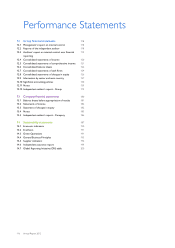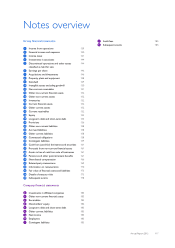Philips 2012 Annual Report Download - page 113
Download and view the complete annual report
Please find page 113 of the 2012 Philips annual report below. You can navigate through the pages in the report by either clicking on the pages listed below, or by using the keyword search tool below to find specific information within the annual report.11 Corporate governance 11.3 - 11.4
Annual Report 2012 113
change the identity or nature of the Company or the business require
the approval of the General Meeting of Shareholders. This includes
resolutions to (a) transfer the business of the Company, or almost the
entire business of the Company, to a third party (b) enter into or
discontinue long-term cooperation by the Company or a subsidiary
with another legal entity or company or as a fully liable partner in a
limited partnership or ordinary partnership, if this cooperation or its
discontinuation is of material significance to the Company or (c) acquire
or dispose of a participating interest in the capital of a company to the
value of at least one-third of the amount of the assets according to the
balance sheet and notes thereto or, if the Company prepares a
consolidated balance sheet, according to the consolidated balance sheet
and notes thereto as published in the last adopted annual accounts of
the Company, by the Company or one of its subsidiaries. Thus the
Company applies principle IV.1 of the Dutch Corporate Governance
Code within the framework of the Articles of Association and Dutch
law and in the manner as described in this corporate governance report.
The Board of Management and Supervisory Board are also accountable,
at the Annual General Meeting of Shareholders, for the policy on the
additions to reserves and dividends (the level and purpose of the
additions to reserves, the amount of the dividend and the type of
dividend). This subject is dealt with and explained as a separate agenda
item at the General Meeting of Shareholders. Philips aims for a
sustainable and stable dividend distribution to shareholders in the long
term. A resolution to pay a dividend is dealt with as a separate agenda
item at the General Meeting of Shareholders.
The Board of Management and the Supervisory Board are required to
provide the General Meeting of Shareholders with all requested
information, unless this would be prejudicial to an overriding interest
of the Company. If the Board of Management and the Supervisory Board
invoke an overriding interest in refusing to provide information,
reasons must be given. If a serious private bid is made for a business
unit or a participating interest and the value of the bid exceeds a certain
threshold (currently one-third of the amount of the assets according
to the balance sheet and notes thereto or, if the Company prepares a
consolidated balance sheet, according to the consolidated balance sheet
and notes thereto as published in the last adopted annual accounts of
the Company), and such bid is made public, the Board of Management
shall, at its earliest convenience, make public its position on the bid and
the reasons for this position.
A resolution to dissolve the Company or change its Articles of
Association can be adopted at the General Meeting of Shareholders by
at least three-fourths of the votes cast, at which meeting more than half
of the issued share capital is represented. If the requisite share capital
is not represented, a further meeting shall be convened, to be held
within eight weeks of the first meeting, to which no quorum
requirement applies. Furthermore, the resolution requires the approval
of the Supervisory Board. If the resolution is proposed by the Board of
Management, the adoption needs an absolute majority of votes and no
quorum requirement applies to the meeting.
Repurchase and issue of (rights to) own shares
The 2012 General Meeting of Shareholders has resolved to authorize
the Board of Management, subject to the approval of the Supervisory
Board, to acquire shares in the Company within the limits of the Articles
of Association and within a certain price range up to and including
October 26, 2013. The maximum number of shares the company may
hold, will not exceed 10% of the issued share capital as of April 26,
2012, which number may be increased by 10% of the issued capital as
of that same date in connection with the execution of share repurchase
programs for capital reduction programs.
In addition, the 2012 General Meeting of Shareholders resolved to
authorize the Board of Management, subject to the approval of the
Supervisory Board, to issue shares or grant rights to acquire shares in
the Company as well as to restrict or exclude the pre-emption right
accruing to shareholders up to and including October 26, 2013. This
authorization is limited to a maximum of 10% of the number of shares
issued as of April 26, 2012 plus 10% of the issued capital in connection
with or on the occasion of mergers and acquisitions.
11.4 Logistics of the General Meeting of
Shareholders and provision of information
Introduction
The Company will set a record date for the exercise of the voting rights
and the rights relating to General Meetings of Shareholders. In
accordance with Dutch law this record date is fixed at the 28th day prior
to the day of the meeting. Shareholders registered at such date are
entitled to attend the meeting and to exercise the other shareholder
rights (in the meeting in question) notwithstanding subsequent sale of
their shares thereafter. This date will be published in advance of every
General Meeting of Shareholders. Shareholders who are entitled to
attend a General Meeting of Shareholders may be represented by
proxies.
Information which is required to be published or deposited pursuant
to the provisions of company law and securities law applicable to the
Company and which is relevant to the shareholders, is placed and
updated on the Company’s website, or hyperlinks are established. The
Board of Management and Supervisory Board shall ensure that the
General Meeting of Shareholders is informed by means of a
‘shareholders circular’ published on the Company’s website of facts and
circumstances relevant to the proposed resolutions.
Resolutions adopted at a General Meeting of Shareholders shall be
recorded by a civil law notary and co-signed by the chairman of the
meeting; such resolutions shall also be published on the Company’s
website within 15 days after the meeting. A summary of the discussions
during the General Meeting of Shareholders, in the language of the
meeting, is made available to shareholders, on request, no later than
three months after the meeting. Shareholders shall have the
opportunity to respond to this summary for three months, after which a
final summary is adopted by the chairman of the meeting in question.
Such summary shall be made available on the Company’s website.
Proxy voting and the Shareholders Communication Channel
Philips was one of the key companies in the establishment of the
Shareholders Communication Channel, a project of Euronext
Amsterdam, banks in the Netherlands and several major Dutch
companies to simplify contacts between a participating company and
shareholders that hold their shares through a Dutch securities account
with a participating bank. The Company uses the Shareholders
Communication Channel to distribute a voting instruction form for the
Annual General Meeting of Shareholders. By returning this form,
shareholders grant power to an independent proxy holder who will
vote according to the instructions expressly given on the voting
instruction form. Also other persons entitled to vote shall be given the
possibility to give voting proxies or instructions to an independent third
party prior to the meeting. The Shareholders Communication Channel
can also be used, under certain conditions, by participating Philips
shareholders to distribute – either by mail or by placing it on the
Company’s or Shareholders Communication Channel’s website –
information directly related to the agenda of the General Meeting of
Shareholders to other participating Philips shareholders.
Preference shares and the Stichting Preferente Aandelen
Philips
As a means to protect the Company and its stakeholders against an
unsolicited attempt to obtain (de facto) control of the Company, the
General Meeting of Shareholders in 1989 adopted amendments to the
Company’s Articles of Association that allow the Board of Management
and the Supervisory Board to issue (rights to) preference shares to a
third party. As a result, the Stichting Preferente Aandelen Philips (the
‘Foundation’) was created, which was granted the right to acquire
preference shares in the Company. The mere notification that the
Foundation wishes to exercise its rights, should a third party ever seem
likely in the judgment of the Foundation to obtain (de facto) control of
the Company, will result in the preference shares being effectively
issued. The Foundation may exercise this right for as many preference
shares as there are ordinary shares in the Company outstanding at that
time. No preference shares have been issued as of December 31, 2012.
In addition, the Foundation has the right to file a petition with the
Enterprise Chamber of the Amsterdam Court of Appeal to commence
an inquiry procedure within the meaning of section 2:344 Dutch Civil
Code.
The object of the Foundation is to represent the interests of the
Company, the enterprises maintained by the Company and its affiliated
companies within the Group, in such a way that the interests of Philips,
those enterprises and all parties involved with them are safeguarded as
effectively as possible, and that they are afforded maximum protection
against influences which, in conflict with those interests, may
undermine the autonomy and identity of Philips and those enterprises,
and also to do anything related to the above ends or conducive to them.
In the event of (an attempt at) a hostile takeover or other attempt to
obtain (de facto) control of the Company this arrangement will allow
the Company and its Board of Management and Supervisory Board to
determine its position in relation to the third party and its plans, seek
























